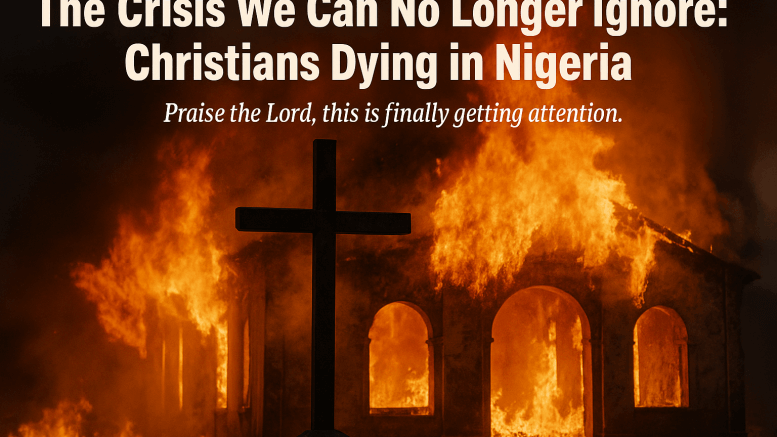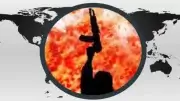Praise the Lord, this is finally getting attention.
When I read Elizabeth Weibel’s recent Breitbart article about President Trump’s response to Christian persecution in Nigeria, those were my first words. Finally, someone in authority recognizes what experts call “the deadliest place in the world to be a Christian.”
Christian persecution in Nigeria has escalated to unprecedented levels. Believers face daily violence, and the international community is now taking notice.
The Sobering Reality
First and foremost, the numbers demand our immediate attention:
According to reports cited by Congressman Riley Moore, over 7,000 Christians have been killed in Nigeria in 2025 alone—averaging 35 believers martyred every single day. Furthermore, since 2009, estimates suggest between 50,000 and 100,000 Christians have lost their lives, while militants attacked or destroyed more than 19,000 churches.
Additionally, Open Doors, an organization that monitors Christian persecution globally, reports that “more Christians are killed for their faith in Nigeria than in the rest of the world combined.” Their field teams document brutal attacks by Islamist militants including Fulani fighters, Boko Haram, and ISWAP (Islamic State West Africa Province). Specifically, militants often kill men outright, while women and girls face kidnapping and sexual violence. Moreover, entire villages burn. Churches crumble. Families flee.
A Picture of Faith Under Fire
However, what strikes me most powerfully is not just the statistics, but the testimonies of those experiencing Christian persecution in Nigeria firsthand. As one Nigerian believer named Abraham, now living in a displacement camp, declares: “We will worship God because He has preserved our lives… I still have God and He is still on the throne. He will surely deliver me.”
Consequently, this is the church persecuted. This embodies the faith that Daniel demonstrated in the lion’s den, that the apostles showed before the Sanhedrin. When believers face death for following Jesus, they proclaim, “He is still on the throne.”
Currently, more than 16.2 million Christians in sub-Saharan Africa, many from Nigeria, have been driven from their homes by violence and conflict. They now survive in displacement camps. Nevertheless, the Nigerian church continues to plant new congregations even in refugee settlements.
The Complexity We Must Acknowledge
Nevertheless, as I dug deeper into this crisis, I discovered something that complicates the narrative but doesn’t diminish the suffering: this isn’t simply “Muslims killing Christians.” Instead, the reality proves more complex.
Specifically, Boko Haram and similar groups follow an extreme form of Sunni Islam (Salafi jihadism) that declares almost everyone else—including other Muslims—to be apostates worthy of death. Therefore, they’ve targeted Shia Muslims, Sufi Muslims, and mainstream Sunni Muslims who don’t support their violent ideology. They’ve killed thousands of Muslims alongside thousands of Christians.
In fact, these groups use takfiri ideology—the practice of declaring other Muslims to be unbelievers. When ISIS tried to rein in Boko Haram leader Abubakar Shekau for killing too many Muslim civilians, he refused and the group split.
Importantly, does this complexity excuse the targeting of Christians? Absolutely not. Does it mean Christians aren’t being specifically persecuted for their faith? No—the evidence overwhelmingly confirms they are. Rather, what it means is that we’re witnessing the fruit of an ideology so radical that it wages war against everyone who doesn’t submit to its twisted interpretation of Islam.
What Does Scripture Call Us To?
Therefore, as believers, we must respond—but how? Scripture gives us clear direction:
First, we must remember our persecuted family. Hebrews 13:3 commands us: “Remember those who are in prison, as though in prison with them, and those who are mistreated, since you also are in the body.”
Second, we must pray. 1 Timothy 2:1-2 urges us to make “supplications, prayers, intercessions, and thanksgivings for all people, for kings and all who are in high positions.” Consequently, pray for protection, for wisdom, for justice, and for the persecutors’ hearts to be changed.
Third, we must speak up. Proverbs 31:8-9 says, “Open your mouth for the mute, for the rights of all who are destitute. Open your mouth, judge righteously, defend the rights of the poor and needy.” Indeed, our brothers and sisters in Nigeria need advocates.
Finally, we must support them practically. Organizations like Open Doors, International Christian Concern, and others provide relief aid, trauma care, discipleship training, and economic support to persecuted believers. Significantly, our giving can literally save lives and strengthen the church under fire.
Questions Without Easy Answers
Meanwhile, President Trump has designated Nigeria as a “Country of Particular Concern” for religious freedom violations. Additionally, he’s threatened to cut aid and has instructed the Department of Defense to prepare for possible military action. Similarly, Senator Ted Cruz has introduced legislation to hold Nigerian officials accountable through sanctions.
However, are these the right responses? I honestly don’t know. Indeed, the question of military intervention raises profound theological, ethical, and practical questions that I’m not qualified to answer definitively. What is the role of government in protecting religious minorities abroad? When does intervention help, and when does it make things worse? Does America have the authority—or responsibility—to act?
Ultimately, these are questions for theologians, ethicists, and policymakers to wrestle with. What I do know is that we cannot remain silent while our brothers and sisters are slaughtered.
Our Response to Christian Persecution in Nigeria
Notably, the Nigerian government has denied that religious persecution is occurring, calling such claims “a lie from the pit of hell.” Nevertheless, the testimonies, the documentation from multiple sources, and the witness of believers on the ground tell a different story.
Therefore, whether or not American military intervention is appropriate, we as the church have clear marching orders:
- Pray daily for Nigerian Christians—for protection, perseverance, and the gospel to advance even through suffering
- Give generously to organizations serving persecuted believers
- Raise awareness by sharing their stories and refusing to let this crisis fade into obscurity
- Advocate by contacting your representatives and urging them to prioritize religious freedom in foreign policy
- Remember that we are one Body, and when one part suffers, we all suffer (1 Corinthians 12:26)
Remarkably, the Nigerian church is resilient. They continue to worship under threat of death. They plant churches in refugee camps. They forgive their persecutors and pray for their enemies, just as Christ commanded.
Consequently, the least we can do is stand with them.
For Further Reading
- Breitbart: Trump Warns U.S. Military ‘May Very Well’ Go into Nigeria
- Open Doors: Nigeria Country Profile
- International Christian Concern: Nigeria Updates
- Congressman Riley Moore’s Letter on Nigeria
“Blessed are those who are persecuted for righteousness’ sake, for theirs is the kingdom of heaven.” – Matthew 5:10





